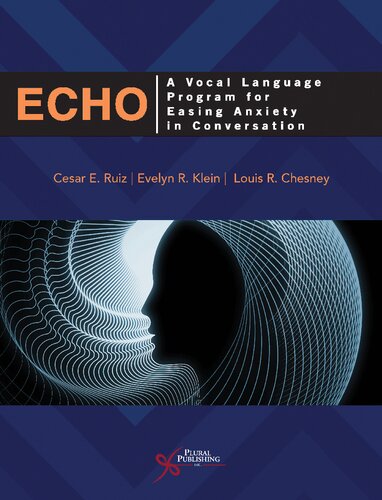ECHO A Vocal Language Program for Easing Anxiety in Conversation 1st Edition by Cesar Ruiz, Evelyn Klein, Louis Chesney 1635503302 9781635503302
$50.00 Original price was: $50.00.$25.00Current price is: $25.00.
ECHO A Vocal Language Program for Easing Anxiety in Conversation 1st Edition by Cesar Ruiz, Evelyn Klein, Louis Chesney – Ebook PDF Instant Download/Delivery: 1635503302, 9781635503302
Full download ECHO A Vocal Language Program for Easing Anxiety in Conversation 1st Edition after payment

Product details:
ISBN 10: 1635503302
ISBN 13: 9781635503302
Author: Cesar E. Ruiz, Evelyn R. Klein, Louis R. Chesney
ECHO: A Vocal Language Program for Easing Anxiety in Conversation is for clinicians supporting individuals who may experience social anxiety related to speaking in specific situations, or with certain individuals. Anxiety has a negative impact on working memory, which can make it difficult for individuals to communicate with ease. With reduced experiences talking to a variety of people in various situations, speaking often becomes more challenging.
The ECHO program was developed to build ease and comfort with social pragmatic communication, focusing on improving conversational skills for children from later elementary through teenage years. The program can be implemented byspeech-language pathologists, psychologists, educators, and other facilitators (including parents), who support the needs of children and teens with selective mutism, stuttering, and those in need of social communication support. This unique intervention program combines methods of vocalization and verbalization to enhance conversational skills with role-play simulations for real-life application.
ECHO A Vocal Language Program for Easing Anxiety in Conversation 1st Table of contents:
MODULE 1: Vocal Control – Gaining Control of Your Voice for Speech Initiation
- Background Introduction and Theoretical Framework
- Proposed Hierarchy for Face-to-Face and Online Sessions: How to Begin
- Process of Vocal Control
- Activity Game 1: Sound Off
- Activity Game 2: Pitch Pipe
- Activity Game 3: Ramp It Up!
- Activity Game 4: Vocal Marathon
- Activity Game 5: Tag Along Words
- Activity Game 6: What’s Up?
- Activity Game 7: Let’s Face It
- References
MODULE 2: Building Social Pragmatic Communication for Children and Teens Who Experience Anxiety in Speaking Situations
- Background Introduction and Theoretical Framework
- Overarching Goals for Module 2
- Activity Game 1: Word Think — The First Word That Comes to Mind
- Activity Game 2: Pinpoint — Words to Sentences
- Activity Game 3: Actors’ Corner — Interactive Scripts
- Activity Game 4: Barriers — Following Directions
- Activity Game 5: Question Match — Answering Questions
- Activity Game 6: More Information Please — Changing Questions
- Activity Game 7: See-Saw — Keep the Conversation Going
- Activity Game 8: Road Runner — Staying on Topic Track
- Activity Game 9: Conversation Wheelhouse
- Activity Game 10: Conversational Role-Plays: Pragmatic Language
- Activity Game 11: Chat Spin — Informal Conversations
- Module 2: Outreach Activities
- References
- Appendix 2–A: Suggestions for Facilitating Activities for Children and Teens With Selective Mutism
- Appendix 2–B: Suggestions for Facilitating Activities for Children and Teens Who Stutter
MODULE 3: Role-Play Simulations for Conversation
- Background Information
- Theoretical Framework
- Using the SMQ as a Guide for Activity Selection and Tracking Progress
- Role-Play Structure
- Facilitator
- Player
- Scenario
- Personal Stories
- In Preparation for the Role-Play
- Role-Play / Activity
- Roles
- Situations
- Reflections
- Cognitive Distortions
- Scenario 1: Talking to General Peers at School
- Scenario 2: Talking to Selected Peers at School
- Scenario 3: Being Asked a Question by the Teacher
- Scenario 4: Asking the Teacher a Question
- Scenario 5: Speaking to Teachers or Staff at School
- Scenario 6: Speaking in Groups or in Front of the Class
- Scenario 7: Talking to Family Members at Home When Others Are Present
- Scenario 8: Talking to Family Members While in Unfamiliar Places
- Scenario 9: Talking to Family Members Who Do Not Live With Me (e.g., grandparent, cousin)
- Scenario 10: Talking on the Phone to Parents and/or Siblings
- Scenario 11: Speaking With Familiar Family Friends
- Scenario 12: Speaking to at Least One Babysitter or Caregiver (not family member)
- Scenario 13: Speaking With Other Kids Whom I Do Not Know
- Scenario 14: Speaking With Family Friends Whom I Do Not Know
- Scenario 15: Speaking With My Doctor or Dentist
- Scenario 16: Speaking to Store Clerks or Waiters
- Scenario 17: Talking When in Clubs, Teams, or Organized Activities Outside of School
- Photo Cards
- References
People also search for ECHO A Vocal Language Program for Easing Anxiety in Conversation 1st:
l-vocalization example
vocal processor for karaoke
l-vocalization
m-audio vocal studio
Tags:
Cesar Ruiz,Evelyn Klein,Louis Chesney,Language,Program
You may also like…
Romance - Science Fiction Romance
Romance - Science Fiction Romance
Echo Online 3 A GameLit Harem 1st Edition Zachariah Dracoulis
Computers - Enterprise Computing Systems
NET Microservices Architecture for Containerized NET Applications Cesar De La Torre
Uncategorized
Reference - Other Reference By Subject
Romance - Science Fiction Romance











